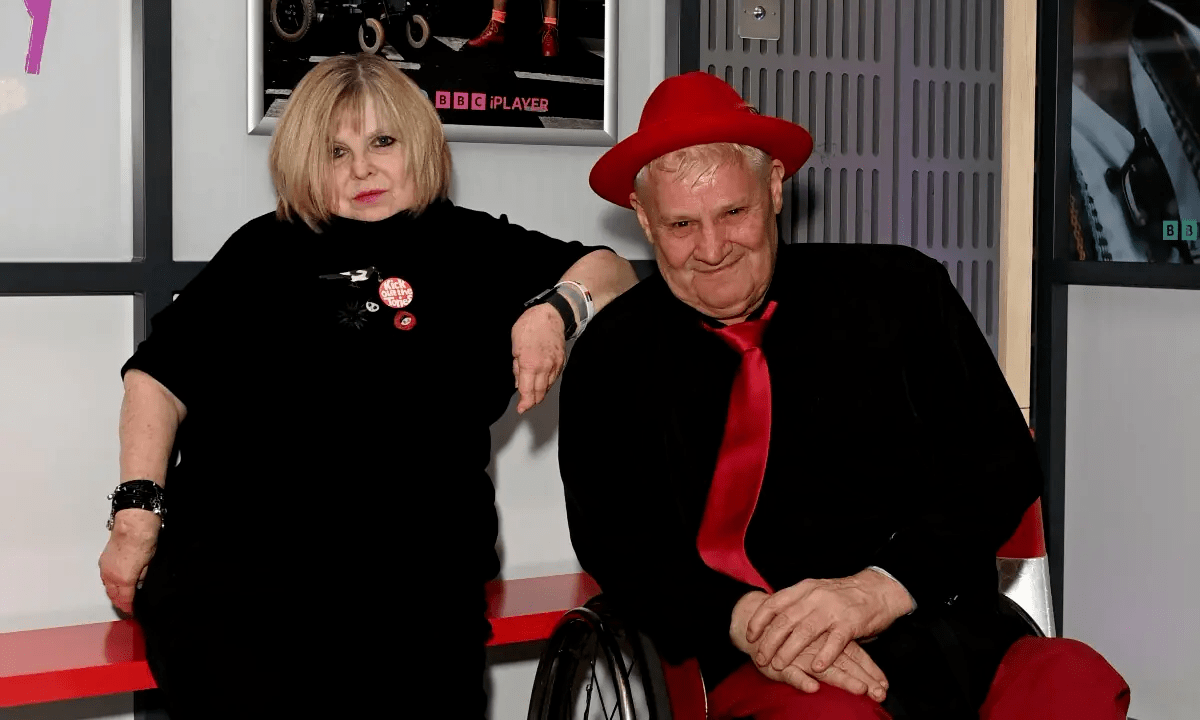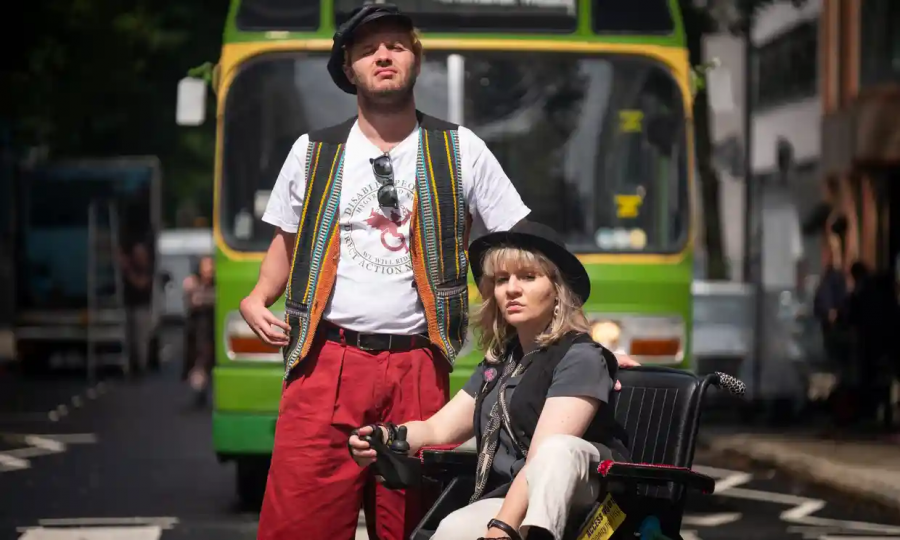-
Advocacy and Campaigns, Health and Disability, Carers, Staying in work, Organisations, In the Press,Blog Views
578
'Then Barbara Met Alan' and the Disabled People’s Direct Action Network
On 21st March, BBC Two aired Then Barbara Met Alan. Based on the story of Barbara Lisicki, Alan Holdsworth and the Disabled People’s Direct Action Network (DAN), the show rewrites the rules of disability representation on television. With its release, we wanted to highlight the history of DAN, its legacy, and how we can continue to promote disability equality.
On 15th March, our CEO Beth-Kume Holland had the privilege of attending the BBC and Netflix premiere of Then Barbara Met Alan. It was a room filled with disabled, deaf and neuro-diverse cast and crew like there’s never been before, and the atmosphere was electric. Airing on BBC Two on 21st March, the docudrama is based on the history of Barbara Lisicki, Alan Holdsworth, and the Disabled People’s Direct Action Network (DAN).
This groundbreaking piece of television follows the untold story of two cabaret performers and disability rights activists who met at a gig. Falling in love, they became the driving force behind an unprecedented campaign of direct action which led to the Disability Discrimination Act (1995).
Thanks to the instrumental work of DAN, many young adults grew up in a society where finally the law protected the rights of disabled people. Highlighting the importance of this turning point, this film also rewrites the conventional representation of disability on mainstream television.
Why is the film so important to us?
With the extraordinary lack of people with disabilities represented on screen, something that’s shocking is how ‘radical’ it felt to just see disabled people living their lives in a way that reflects the reality for so many of us. If TV and film were more representative, this would (and should) not be a significant factor in the viewing experience.
However, according to GLAAD, just 3.5% of characters in broadcast scripted series had disabilities in the 2020-2021 season. Furthermore, actors without disabilities play the majority of all characters with disabilities on-screen.
This film arrives at a difficult time for disabled people in the UK. Our rights are being eroded, with benefits being cut at a time when a cost of living crisis sees disabled people disproportionately impacted, around three times more likely to struggle to afford food.
It is also somewhat ironic that many of the actions of the film may soon be restricted by the Police, Crime, Sentencing and Courts Bill, which is set to criminalise and curtail certain civil disobedience of the kind Barbara, Alan and DAN use in the film. This film shows us the power of such non-violent action and how it underpins progress.
In this context, the film is so timely and important. It is a watershed moment and with its release, we thought we’d share with you the history of DAN and some of the organisation's great achievements.

Beth Kume-Holland and Ruth Madeley (who plays Barbara Lisicki)
The History of DAN
DAN is a UK-wide network of disabled activists who use non-violent direct action to fight for equal treatment and full civil and human rights. They’re part of the disabled people's movement campaigning for equality.
Established in 1993, DAN have since organised around 56 actions, of which 17 were national events. While local actions typically last a single day, national actions developed into three-day long events. Creating public awareness, these events aimed to, and achieved real change.
Key national actions by DAN (1993-2002):
1993 -
The first national action by DAN. A demonstration in Christchurch against Bob Hayward MP, who had spoken out against a civil rights bill in the House of Commons.
1994 -
Rally in Trafalgar Square, with the signing of a huge letter to Prime Minister, John Major.
Street protests in London and Westminster Central Hall. The Independent on Sunday reported 25 arrests on the second day.
1995 -
Street protests in Birmingham. A demonstration outside a trade show of new buses for sale resulted in £130m for accessible buses.
1996 -
Street protests in Nottingham. DAN stopped rush hour traffic across the city on the first day and were kettled in a surface car park by police on the second day. This resulted in the Robin Hood Line and Central Trains becoming more accessible.
1997 -
Street protests in London - “Going Underground”:
-
3rd April: Confederation of Passenger Transport offices.
-
4th April: London Transport HQ and Baker Street tube station.
-
5th April: Labour HQ (Millbank Tower) occupation and demo, and the Conservative HQ, demo outside.
1998 -
Street protests in London including the government’s transport department (DETR).
Street protests in Hull - “Hell in Hull”. Protests at John Prescott’s office, the Secretary of State for transport.
1999 -
Street protests in London (26th-28th September), followed by a “Future of DAN” meeting on 29th September.
2001 -
Street protests in London, “Free Our People”:
-
Day 1: Offices of the political parties.
-
Day 2: Department of Health and the Leonard Cheshire charity.
-
Day 3: DETR and Parliament.
2002 -
Street protests in DAN Action in London, the last DAN multi-day national action.
If you’re interested in learning about all of DAN’s national and local actions, check out this detailed timeline of DAN’s Actions.
The Disability Discrimination Act (1995)
One of the lasting legacies of DAN’s determination was the establishment of the Disability Discrimination Act. Receiving royal assent on 8th November 1995, the Disability Discrimination Act introduced new laws to prevent discrimination against people with disabilities.
The Act made it unlawful to discriminate against disabled persons in connection with:
-
Employment and training.
-
Education.
-
The provision of goods.
-
Facilities and services, or the disposal or management of premises.
-
Transport.
These were introduced to tackle different types of discrimination facing individuals with disabilities. Some of these types of discrimination include:
-
Direct discrimination.
-
Disability-related discrimination.
-
Failure by an organisation to make reasonable adjustments.
-
Victimisation.
-
Harassment.
While by no means a perfect piece of legislation, this Act was the first time that it was recognised in law that disabled people were being discriminated against and provided a crucial platform to build on.
There was a further Disability Discrimination Act in 2005, before both were absorbed into the 2010 Equality Act. These Acts represent the legislative leaps forward that the disability rights movement has undergone in recent years.
The Continuing Battle
The recent release of Then Barbara Met Alan tells the story of DAN and their quest for disability rights. Completely changing the traditional representation of disability on mainstream British television, this docudrama also highlights the ever-important need to continue the fight for equality.
This is particularly true considering the COVID-19 pandemic, which has eroded some of the vital work into accessibility and disability rights in recent years. As a study by Euan’s Guide concluded, 59% of disabled people believe that COVID has made disabled access worse. Now more than ever it’s important to invest in disabled people’s organisations like DAN, and continue fighting for what is right.
Here at Patchwork Hub, we’re committed to making the world of work a more accessible place. Since the pandemic, the world of work has changed. Our model of work has not, however. A recent Scope study found that as many as 1 million disabled people in the UK are able and willing to work, but are prevented from doing so. As an accessible employment platform, we connect employers with highly-skilled professionals looking for more accessible work opportunities. We’re determined to narrow the disability employment gap and ensure equality of employment.
However, this road to equality is long. We continue to fight for the rights and opportunities of people with disabilities, and are determined to make the working world a more accessible place. With this in mind, we hope that enlightening films such as Then Barbara Met Alan make the world a more accommodating and accessible place. Increasing awareness of disability history through mainstream platforms, we hope to see more like this in the future!

The real Barbara Lisicki and Alan Holdsworth. Photo: Getty Images
Did you watch Then Barbara met Alan? Let us know your thoughts about it in the comments below!
Follow DAN on Facebook
Follow DAN on Twitter
Timeline of DAN actions
Published: 25th March 2022
Tags
All Tags
Ability Connect Academy for Disabled Journalists Academy for Disabled SEO Specialists Access2Funding Accessibility Accessibility information Accessibility int he workplace Accessibility ramps Accessible education Accessible locations Accessible places Acid reflux Adaptive fashion Advocacy AI Aleto Foundation All Saints Alt text Aspiring Entrepreneurs with Disability Development Programme Assistive technology Autism Awareness Barriers Beth Kume-Holland Blog Budgeting Bullying BUPA Burnout Business Business Disability Forum Business model creation Business skills Business workshop Businesses Cancer Candidates Captions Cash flow Cerebral palsy Characters Charity Charity sector Chronic pain Closed captions Clothes Clothing Cognitive disabilities Comfort zone Communication Community networks Companies Company Company Corner Company culture Confidence Confucius Consultant Consultation Content creator Content designer Data talent Diagnosis Difference Digital and social media marketing Digital transformation Disabilities Disability advocate Disability advocates Disability and Neurodiversity Network Disability awareness Disability Awareness Training Disability community Disability confident Disability Confident Leader Disability employment Disability inclusion Disability news Disability Policy Centre Disability Pride Disabled Disabled candidates Disabled community Disabled founders Disabled people Disabled People’s Direct Action Network Disabled talent Disabled team Disabled-led Diverse Diverse workforce Diversity Diversity and inclusion Diversity Project Diversity Recruitment Platform Domestic violence Dysfluency ED&I EDDP Education Education and resource platform Employment opportunities Employment platform Empowerment Equality Act 2010 Ethnic minorities Eventbrite Expert teachers Expert training Fashion Fashion industry Fathom Feedback Finances Financial goals Financial planning Financial plans Financial services Financial services sector Flexible work Freelance FTSE 100 Fund management GAIN Game Gaming Gareth Walkom Garment technologist Gastrointestinal conditions Gem Turner Gender Gender Networks Grant Logan Guide dog Healthcare Hidden talent pool Homeworking Hospice UK Compassionate Employers Programme HR Hybrid working Ian MacKenzie Inclusion Inclusive culture Inclusive workforce Inclusivity India Inspiration Intellectual capabilities Interview process Interviews Investments Invisible disabilities Invisible disability Isaac Harvey Isaac Harvey MBE Istituto Marangoni Jack Wills Job descriptions Job interviews Job opportunities Job vacancies Journalism Journalists Learning disability Leeds Leeds trinity university Legislation LGBT Great LGBTQ+ Limb-pelvic hypoplasia LinkedIn LinkedIn influencer Listening service Lloyds Bank London London Fashion Week Long-term health condition Long-term health conditions Mapping days Mark Esho Matt Pierri Maya angelou Meta Metaverse Migrants Motivation Multinational firm Musculoskeletal conditions National Council for the Training of Journalists NCTJ Neurodivergence Neurodivergent Neurodiverse Neurodiversity consultant Neurodiversity space Neurotype Neurotypes New Delhi News Non-disabled founders Non-profit Novos OBS Occupational health Office environment Organisations Partially sighted Partnership Patchworkers People Phase Eight Phone calls Physical disabilities Pirate video games Policy Poverty Presentations Pride Network Primark Processes and systems Professional Women’s Network Progress Together Public speaking Puneet Singh Singhal Race Race and Ethnicity Network Raising awareness Registered blind Remote course Remote education Remote learning Remote work Removing barriers Resilience Revenue streams Rights School Scoliosis Scope Search engine optimisation Selection process Self-employed Self-employment Senior staff Sexuality Shaw trust Shaw trust power 100 list Sign language SJP Small Business Britain Social impact Social mission Social mobility Social-emotional learning Social-emotional learning platform Software Speaking situation Speech differences Speech disabilities Speech impediment Spotlight series Spotlight stories Ssstart St. James’s Place Charitable Foundation Staff Stammer Stammering Stonewall Stories Stuttering Sustainable change Sweaty Betty Target market Tech industry Tech talent TEDx Tesco Think tank Training Underrepresentation Unhidden Unhidden Clothing Universities University of Leicester Vanessa Castañeda Gill Victoria Beckham Video editor Video game Vimeo Violence Virtual reality VR Wealth management Web accessibility Wheels and Wheelchairs Women Work environment Work from home Working conditions Working Families Group Working from home Workplace adjustments Youth Zoom Abc Ability Today Access to work Accessibility in the workplace Accessibility test Accessible work Acting Adhd Adjustments Administrative Adrian lord Advice Advocacy and campaigns Allparty parliamentary group for inclusive entrepreneurship American civil rights movement Android Anglonorman App Artificial intelligence Bad grammar Barriers to work Bbc Benefits Blind persons act Blue badge Blue badge service specialists Care Career Carer Celtic languages Center on everyday lives of families Ceo Cfs Chloe tear Chronic fatigue syndrome Chronic health condition Chronic illness Commodo aute beatae Community Community story Community, community story, founder, feature, accessible work, disability employment gap, making a difference Companies house Compressed hours Computer science Computers Coronavirus Councils Covid19 Crystal mark standard Deaf Design Dialects Dictionary Digital accessibility Disability Disability discrimination act Disability employment gap Disability rights movement Disability services Disabled peoples direct action network Disabled persons employment act Disabled-led organisation Easy read Edit Tag Test 2 Email address Employer Spotlight Employers Employment English English speakers Entrepreneur Entrepreneurship Epilepsy Equality Equality act Equality and diversity Equality of access Esources, disability, disability services, support services, community story, features, adjustments, social support network Esse vero eum nisi a Eugenics Facebook Feature Features Fibromyalgia First world war Flexi Flexible working Flexitime Flextime Founder Francesco cirillo Freelancing French Gcses Gdpr General data protection regulation Good Good grammar Google Government policy Government support Graduate Graduates Grammar Grammar schools Health Health condition Health conditions Hearing impairment Help And Support Tags History History of language Holistic Ico Impact Imposter syndrome Inclusive entrepreneur network Inequalities Inequality Information commissioners office Information governance Instagram Internet Jacqueline winstanley Laborum Magna moles Language Latin Law Learning difficulties Lexicographers Limited company Local councils Local government Making a difference Marketing strategy Mecfs Medical conditions Medical model of disability Medical vs social models of disability Medicines Mental health Middle english Mindfulness Mlm Mobility issues Molestias quod sapie Multilevel marketing Nam eaque iure aut v National league of the blind Neurodiversity Nihil corporis aliqu Niya Normans Old english Old french Onboarding and retention Online Out of work Oxbridge Parent Passwords Patchwork hub Payment details Planning Planning for work Podcasts Pomodoro Preposition Private schools Psychiatric Psychiatry Punctuation Qui voluptatem debi React Reasonable adjustments Recruitment Remote working Resources Resources and support Rest Retinopathy of prematurity Sales Scam Search engine Second world war Shell shock Slang Sociability Social Cipher Social interactions Social media Social model of disability Social support network Socialising Spelling Spoken language Spotlight series Spotlight stories St. James’s Place Standard english Startup State schools Student Students Studying Suffragette movement Support Support services Syntactician Syntax Tag Technology The Disability Policy Centre The elderly Then barbara met alan Trafalgar square Turkish United nations Universal inclusion University University of arts london University of cambridge University of hertfordshire University of hull University of leeds University of oxford Victoria Jenkins Visual impairment War Ways of working West germanic dialects William shakespeare Windsor consultations WithVR Wordpress Work structure Workforce recruitment Working environment Workplace barriers World war one World war two Young carer -




